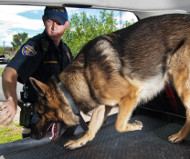Article from: www.thenewspaper.com/news/42/4239.asp
10/25/2013
Louisiana: Federal Judge OKs Drug Dog Search In Driveway
Federal judge allows police to use drug dogs to search cars in a driveway without a warrant.
 The trial of Rickey Nikki Beene proceeds this week with prosecutors given a Friday deadline to justify admission of evidence that came from searching the man's driveway on June 1, 2012 in Haynesville, Louisiana. Officers Danny Mills and Trent Crook were at a party at Police Chief Anthony Smith's house when they received a call that Beene had pulled a gun near the Mill Street Apartment Complex. From there, Beene then drove his gray Honda Accord to his residence, where police caught up to him. As Beene pulled into the driveway and exited his Honda, Officer Mills pulled up and got out of his squad car. Beene was ordered to stop and put his hands on the trunk so he could be placed under arrest.
The trial of Rickey Nikki Beene proceeds this week with prosecutors given a Friday deadline to justify admission of evidence that came from searching the man's driveway on June 1, 2012 in Haynesville, Louisiana. Officers Danny Mills and Trent Crook were at a party at Police Chief Anthony Smith's house when they received a call that Beene had pulled a gun near the Mill Street Apartment Complex. From there, Beene then drove his gray Honda Accord to his residence, where police caught up to him. As Beene pulled into the driveway and exited his Honda, Officer Mills pulled up and got out of his squad car. Beene was ordered to stop and put his hands on the trunk so he could be placed under arrest.
Minutes later, officers Crook and Rickey Goode arrived with a drug dog. Shauntae Heard Beene, Rickey's wife, came out and said she owned the Honda and did not consent to any search. Officer Goode used the dog anyway, saying Rickey Beene had a "known reputation as far as being a drug dealer there, basically." The dog alerted and a search turned up drugs, a gun and $1000.
In court, the Beenes argued that the car was on a driveway, within the curtilage of the house and that it should not have been searched without a warrant, as required under the Fourth Amendment. US District Judge Elizabeth Erny Foote disagreed on the grounds that the arrest in the driveway was equivalent to a traffic stop, even though there was no pursuit.
"It is true that the facts are lacking two points commonly associated with traffic stops: a vehicle en route on a public road and evidence of pursuit by the officer, namely lights and/or sirens," Judge Foote ruled. "Nonetheless, the court finds little differentiating this factual scenario from that of a traffic stop, when we consider the totality of circumstances leading up to the scene at Beene's residence."
The magistrate last month rejected Beene's motion to suppress the evidence, arguing the driveway is not a space protected by the Fourth Amendment.
"The court received extensive testimony, over the course of the three-day hearing, regarding the physical parameters and relative positioning of defendant Beene's trailer, lot, driveway, and back yard fencing," Judge Foote ruled. "Based on the officers' testimony, as well as drawings and photographs of the physical scene, it is clear that the distance from the driveway to defendant Beene's residence does not bring the driveway within the curtilage of the home. Despite some testimonial discrepancies regarding the exact proximity of the residence to the vehicle, which varied from five to seven feet, the court is confident that this particular driveway falls outside of the curtilage."
Because the drug dog could be used in a valid traffic stop outside the home, the judge found the officers' actions appropriate. The trial goes before a jury beginning December 2.
A copy of the decision is available in a 300k PDF file at the source link below.
Source: US v. Beene (US District Court, Western District Louisiana, 9/24/2013)
Permanent Link for this item
Return to Front Page
 The trial of Rickey Nikki Beene proceeds this week with prosecutors given a Friday deadline to justify admission of evidence that came from searching the man's driveway on June 1, 2012 in Haynesville, Louisiana. Officers Danny Mills and Trent Crook were at a party at Police Chief Anthony Smith's house when they received a call that Beene had pulled a gun near the Mill Street Apartment Complex. From there, Beene then drove his gray Honda Accord to his residence, where police caught up to him. As Beene pulled into the driveway and exited his Honda, Officer Mills pulled up and got out of his squad car. Beene was ordered to stop and put his hands on the trunk so he could be placed under arrest.
The trial of Rickey Nikki Beene proceeds this week with prosecutors given a Friday deadline to justify admission of evidence that came from searching the man's driveway on June 1, 2012 in Haynesville, Louisiana. Officers Danny Mills and Trent Crook were at a party at Police Chief Anthony Smith's house when they received a call that Beene had pulled a gun near the Mill Street Apartment Complex. From there, Beene then drove his gray Honda Accord to his residence, where police caught up to him. As Beene pulled into the driveway and exited his Honda, Officer Mills pulled up and got out of his squad car. Beene was ordered to stop and put his hands on the trunk so he could be placed under arrest.